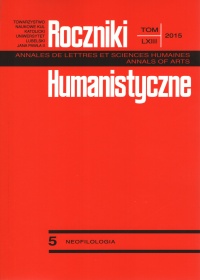Comparison between the Temporal System of the Polish and Portuguese Language
Abstract
The aim of this study is to compare the temporal system of the Polish and Portuguese language that is to indicate common and distinguishing features between two above mentioned systems. Therefore firstly it shall be considered how both systems are functioning, secondly the most fundamental criteria of such comparison shall be established. Finally an analysis of temporal values of the particular verbal forms shall be conducted. Furthermore the purpose of this study is to compare means of expression of the temporal category in Polish with means of expression of the temporal category in Portuguese.
As a result the study indicated that the temporal category together with category of aspect form interconnected grammatical categories which meet on the functional basis. While in Portuguese time and aspect are expressed by morphemes cumulating both functions, Polish has different means of expression of each of these categories. The study enabled to formulate conclusions regarding similarities and differences between both systems as well as to indicate specific features which emphasize uniqueness of each analyzed system.
References
Benveniste, Émile. 1966. Problèmes de linguistique générale. Paris: Gallimard.
Boléo, Manuel de Paiva. 1936. O perfeito e o pretérito em português em confontação com as outras línguas românicas. Coimbra: Biblioteca da Universidade de Coimbra.
Boléo, Manuel de Paiva. 1974. “Os valores temporais e modais do futuro imperfeito e do futuro perifrástico em português”. Biblos 41: 87–115.
Campos, Maria Henriqueta Costa. 1984. “Pretérito Perfeito Simples-Pretérito Perfeito Composto: uma oposição aspectual e temporal”. Letras Soltas 2: 11–53.
Campos, Maria Henriqueta Costa. 1997. Tempo, Aspecto e Modalidade. Estudos de Linguística Portuguesa. Porto: Porto Editora.
Carpinteiro, Maria da Graça. 1961. “Aspectos do mais-que-perfeito do indicativo em português moderno”. Boletim da Filologia 19: 199–208.
Castagnou, Didier. 1964. “Le présent perfectif slave n’est qu’un futur ?” Rocznik Slawistyczny 23: 27–45.
Cerný, Jiři. 1969. “Sobre la asimetria de las categorias del tiempo e del aspeto en el verbo espanol”. Philologica Pragensia 12: 83–93.
Costa, Sônia Bastos Borba. 1990. O aspecto em português. São Paulo: Contexto.
Cunha, Celso, e Lindley Cintra. 1984. Nova Gramática do Português Contemporâneo. Editora Nova Fronteira.
Hlibowicka-Weglarz, Barbara. 1998. Processos de expressão do aspecto na língua portuguesa: algumas observações de carácter contrastivo polaco-portugues. Lublin: Wydawnictwo UMCS.
Mateus, Maria Helena Mira, Ana Maria Brito, Inês Duarte, Isabel Hub Faria et al. 1983. Gramática da língua portuguesa. Coimbra: Livraria Almedina.
Raposo, Eduardo Buzaglo Paiva, Maria Fernanda Bacelar do Nascimento, Maria Antónia Coelho da Mota, Luísa Seguro, e Amália Mendes. 2013. Gramática do Português, vol. I. Lisboa: Calouste Gulbenkian.
Vendryes, Joseph. 1968. Le langage. Introduction historique à l’histoire. Paris: Éditions Albin Michel.
Copyright (c) 2015 Roczniki Humanistyczne

This work is licensed under a Creative Commons Attribution-NonCommercial-NoDerivatives 4.0 International License.





